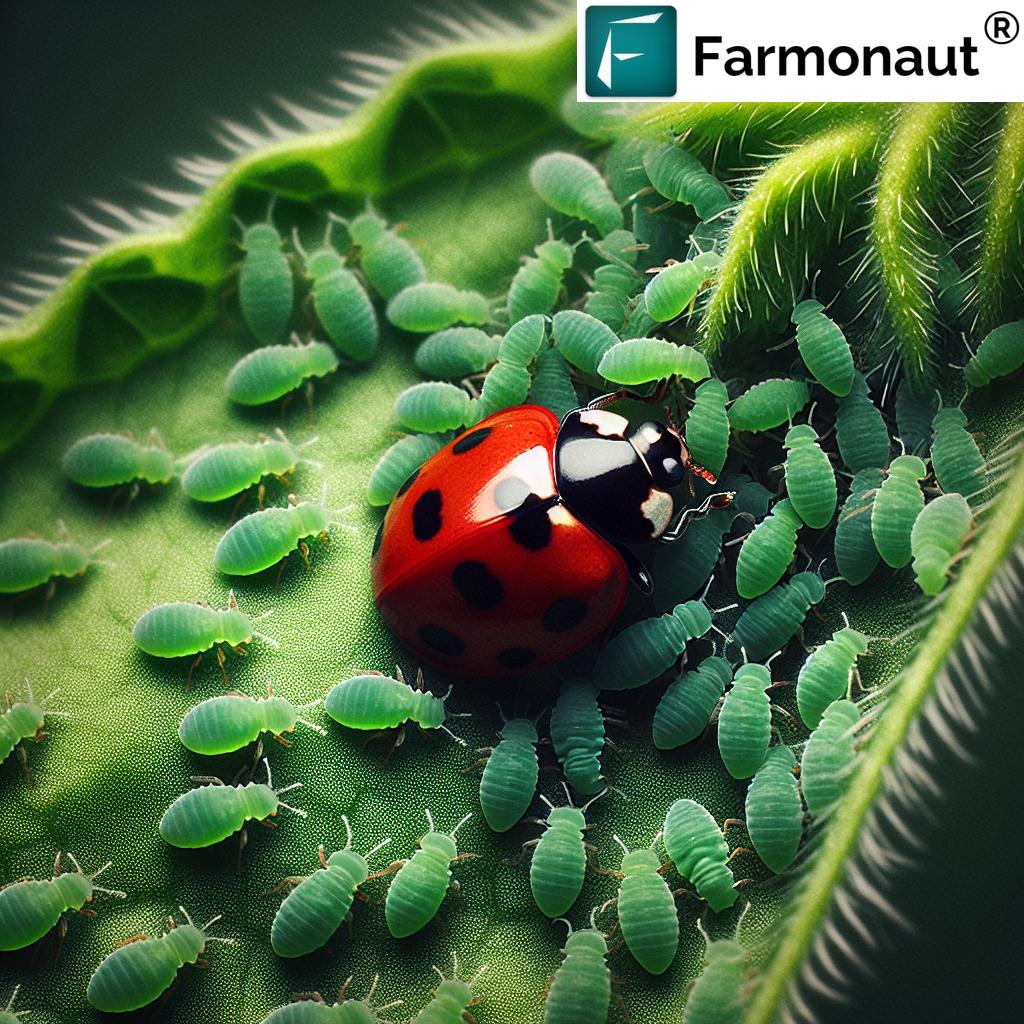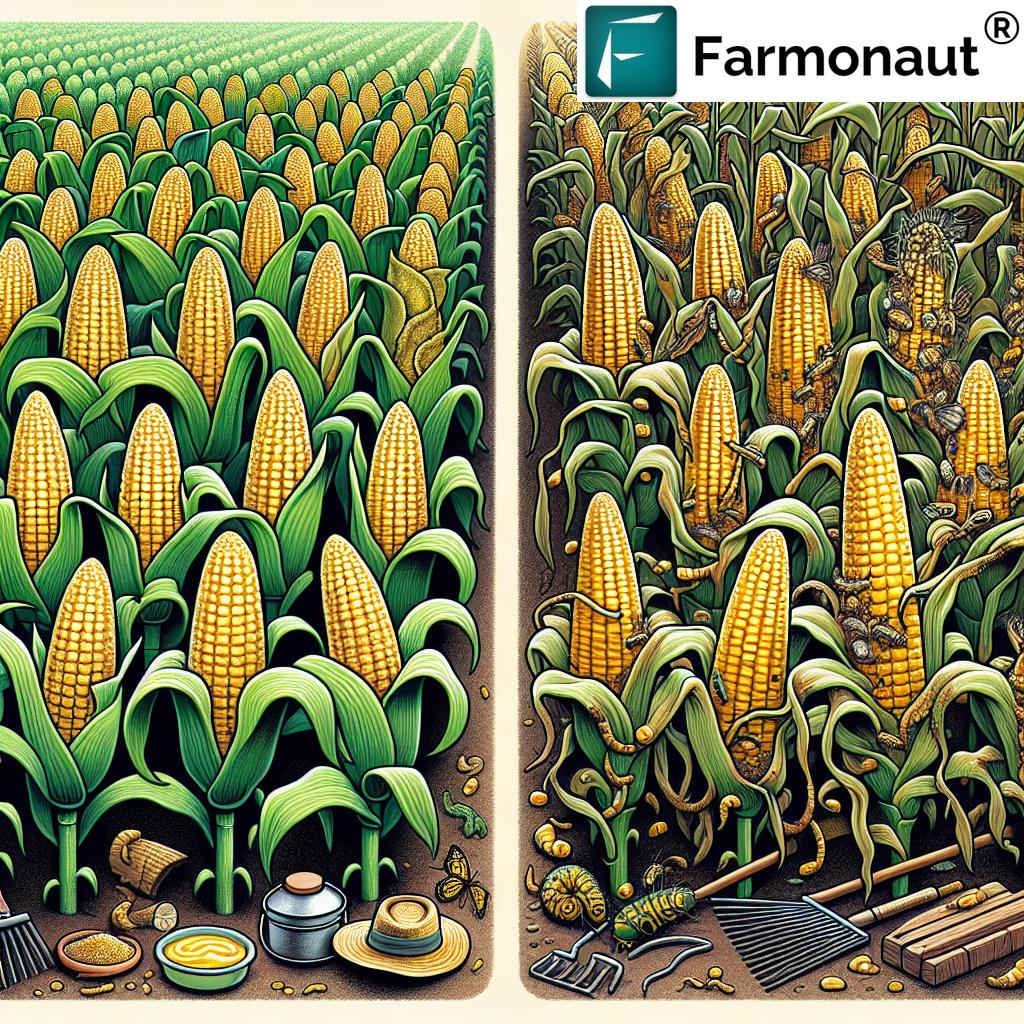Organic Pest Control: Protecting Crops from Mites, Caterpillars, and Armyworms Without Chemicals

In the world of agriculture, protecting crops from pests is a constant challenge. As we move towards more sustainable and environmentally friendly farming practices, the demand for organic pest control methods has significantly increased. At Farmonaut, we understand the importance of balancing crop protection with ecological responsibility. In this comprehensive guide, we’ll explore effective organic strategies to combat common pests like mites, caterpillars, and armyworms without relying on harmful chemicals.
Understanding the Threat: Mites, Caterpillars, and Armyworms
Before diving into control methods, it’s crucial to understand the pests we’re dealing with:
Mites
Mites are tiny arachnids that can cause significant damage to crops. Some common species include:
- Spider mites
- Broad mites
- Rust mites
These pests often thrive in hot, dry conditions and can quickly multiply, leading to stunted plant growth, leaf discoloration, and reduced yields.
Caterpillars
Caterpillars are the larval stage of moths and butterflies (Lepidoptera). Some destructive species include:
- Cabbage loopers
- Tomato hornworms
- Cutworms
These voracious eaters can defoliate plants rapidly, causing severe damage to crops.
Armyworms
Armyworms are a type of caterpillar known for their ability to “march” across fields in large numbers, devastating crops in their path. Common species include:
- Fall armyworm
- Beet armyworm
- True armyworm
These pests can cause extensive damage to various crops, including corn, wheat, and sorghum.
The Case for Organic Pest Control
While conventional chemical pesticides have been widely used for decades, there’s a growing shift towards organic pest control methods. Here’s why:
- Environmental Protection: Organic methods reduce the risk of soil and water contamination.
- Biodiversity Preservation: Non-chemical approaches help maintain beneficial insect populations and overall ecosystem balance.
- Health Benefits: Organic practices minimize exposure to potentially harmful chemical residues for farmers and consumers.
- Pest Resistance Management: Organic methods can help prevent the development of pesticide-resistant pest populations.
- Market Demand: There’s an increasing consumer preference for organic products, often commanding premium prices.
Organic Pest Control Strategies
Let’s explore various organic methods to control mites, caterpillars, and armyworms:
1. Biological Control
This approach involves using natural predators, parasites, or pathogens to control pest populations:
- For Mites: Release predatory mites like Phytoseiulus persimilis or Neoseiulus californicus.
- For Caterpillars and Armyworms: Introduce parasitic wasps (Trichogramma spp.) or predatory insects like lacewings and ladybugs.
- Microbial Control: Use Bacillus thuringiensis (Bt) products, which are effective against many caterpillar species.
2. Cultural Practices
Implement farming techniques that naturally deter pests:
- Crop rotation to disrupt pest life cycles
- Intercropping or companion planting to confuse pests and attract beneficial insects
- Proper irrigation and soil management to promote plant health and resilience
- Timely planting and harvesting to avoid peak pest periods
3. Physical Barriers
Use physical methods to prevent pest access to crops:
- Install row covers or netting to protect plants from flying insects
- Apply diatomaceous earth around plants to deter crawling pests
- Use sticky traps to capture adult insects before they lay eggs
4. Plant-Based Repellents and Insecticides
Utilize natural plant extracts with pesticidal properties:
- Neem oil for broad-spectrum pest control
- Pyrethrin sprays derived from chrysanthemum flowers
- Garlic or hot pepper sprays as repellents
5. Pheromone Traps
Use species-specific pheromones to:
- Monitor pest populations
- Disrupt mating cycles
- Trap and remove adult insects
6. Soil Health Management
Maintain healthy soil to support strong plant growth:
- Use compost and organic fertilizers to improve soil structure and nutrient content
- Encourage beneficial soil microorganisms that can help suppress pest populations
- Practice cover cropping to enhance soil health and disrupt pest cycles

Implementing Organic Pest Control: A Step-by-Step Approach
To effectively protect your crops using organic methods, follow these steps:
- Regular Monitoring: Inspect your crops frequently for signs of pest infestation. Early detection is crucial for successful control.
- Identify the Pest: Correctly identify the pest species to choose the most effective control method.
- Assess Damage Levels: Determine if the pest population has reached a threshold that requires intervention.
- Choose Appropriate Methods: Select organic control methods based on the pest type, crop, and severity of infestation.
- Implement Control Measures: Apply the chosen methods, ensuring proper timing and application techniques.
- Evaluate Effectiveness: Monitor the results of your control measures and adjust as necessary.
- Record Keeping: Maintain detailed records of pest occurrences, control methods used, and their effectiveness for future reference.
Farmonaut’s Role in Organic Pest Management
At Farmonaut, we’re committed to supporting farmers in their transition to organic pest control methods. Our satellite-based crop monitoring system plays a crucial role in early pest detection and management:
- Early Detection: Our advanced satellite imagery can detect subtle changes in crop health, potentially indicating pest infestations before they become visible to the naked eye.
- Targeted Interventions: By identifying specific areas of concern, we help farmers apply organic pest control methods more precisely, reducing overall resource use.
- Monitoring Effectiveness: Our continuous monitoring allows farmers to track the effectiveness of their organic pest control strategies over time.
- Data-Driven Decision Making: With access to historical and real-time data, farmers can make informed decisions about when and where to implement organic pest control measures.
To learn more about how Farmonaut can support your organic pest management efforts, visit our application page or explore our API services.
Conventional vs. Organic Pest Control: A Comparison
| Pest Type | Conventional Chemical Solutions | Organic Alternatives |
|---|---|---|
| Mites | Synthetic acaricides (e.g., Abamectin, Bifenazate) | Predatory mites, neem oil, horticultural oils |
| Caterpillars | Synthetic insecticides (e.g., Pyrethroids, Carbamates) | Bt sprays, parasitic wasps, hand-picking |
| Armyworms | Broad-spectrum insecticides (e.g., Chlorpyrifos, Lambda-cyhalothrin) | Neem oil, Bt sprays, pheromone traps |
| Early Detection | Regular field scouting | Farmonaut’s satellite monitoring for early pest infestation detection, enabling timely organic interventions and reducing crop losses |
Case Studies: Successful Organic Pest Control
While we don’t include specific case studies or success stories, it’s worth noting that many farmers worldwide have successfully implemented organic pest control strategies. These methods have been particularly effective in integrated pest management (IPM) systems, where multiple approaches are combined for optimal results.
Challenges and Solutions in Organic Pest Control
While organic pest control offers numerous benefits, it’s not without challenges. Here are some common issues and potential solutions:
1. Higher Initial Costs
Challenge: Some organic methods may have higher upfront costs compared to conventional pesticides.
Solution: Consider the long-term benefits, including reduced environmental impact, potential price premiums for organic products, and improved soil health. Utilize Farmonaut’s satellite monitoring to optimize resource allocation and reduce unnecessary treatments.
2. Slower Action
Challenge: Organic pest control methods may take longer to show results compared to chemical pesticides.
Solution: Focus on prevention and early intervention. Use Farmonaut’s early detection capabilities to identify pest issues before they become severe, allowing for timely organic control measures.
3. Weather Dependence
Challenge: Some organic products may be less effective in certain weather conditions.
Solution: Utilize Farmonaut’s weather forecasting features to plan applications during optimal conditions. Combine multiple organic methods for more consistent protection.
4. Knowledge and Skill Requirements
Challenge: Effective organic pest control often requires more in-depth knowledge of pest biology and ecosystem interactions.
Solution: Invest in education and training. Leverage Farmonaut’s AI-powered advisory system for tailored recommendations based on your specific crop and pest situations.
The Future of Organic Pest Control
As we look ahead, several trends and innovations are shaping the future of organic pest control:
- Advanced Biocontrols: Development of more effective and targeted biological control agents.
- Precision Agriculture: Integration of technologies like Farmonaut’s satellite monitoring for more precise pest management.
- Plant Breeding: Creation of pest-resistant crop varieties through traditional breeding and advanced genomic techniques.
- Nanotechnology: Development of nanoformulations for improved delivery of organic pest control agents.
- Artificial Intelligence: Enhanced pest prediction models and decision support systems.
Regulatory Considerations for Organic Pest Control
When implementing organic pest control methods, it’s essential to be aware of relevant regulations:
- Familiarize yourself with organic certification standards in your region.
- Ensure all products used are approved for organic production.
- Maintain detailed records of all pest control activities for certification and compliance purposes.
- Stay informed about any changes in organic regulations that may affect your pest control practices.
Integrating Farmonaut’s Technology with Organic Pest Control
Farmonaut’s advanced satellite-based farm management solutions can significantly enhance your organic pest control efforts:
- Satellite Monitoring: Our high-resolution satellite imagery helps detect early signs of pest infestation, allowing for timely organic interventions.
- AI-Powered Analytics: Our Jeevn AI system analyzes crop health data to provide personalized recommendations for organic pest management.
- Weather Forecasting: Accurate weather predictions help you time your organic pest control applications for maximum effectiveness.
- Historical Data Analysis: Track pest patterns over time to develop more effective prevention strategies.
- Mobile App Access: Monitor your crops and receive pest alerts on-the-go with our mobile apps available for Android and iOS.
To learn more about integrating Farmonaut’s technology into your organic pest control strategy, explore our API documentation.
Conclusion
Organic pest control offers a sustainable and effective approach to protecting crops from mites, caterpillars, armyworms, and other pests. By combining biological controls, cultural practices, and innovative technologies like Farmonaut’s satellite monitoring, farmers can maintain healthy crops while minimizing environmental impact. As we continue to face challenges in agriculture, including climate change and evolving pest pressures, the importance of organic pest control methods will only grow.
At Farmonaut, we’re committed to supporting farmers in their transition to more sustainable practices. By providing advanced monitoring tools and data-driven insights, we aim to make organic pest control more accessible and effective for farmers worldwide.
FAQs
- Q: How effective are organic pest control methods compared to chemical pesticides?
A: Organic methods can be highly effective when implemented correctly and as part of an integrated pest management strategy. While they may sometimes work more slowly than chemical alternatives, they offer long-term benefits for soil health and ecosystem balance. - Q: Can I use Farmonaut’s services if I’m not farming organically?
A: Absolutely! Farmonaut’s technology is beneficial for all types of farming, whether organic or conventional. Our services can help optimize pest management strategies regardless of the specific methods used. - Q: How often should I monitor my crops for pests?
A: Regular monitoring is crucial. With Farmonaut’s satellite monitoring, you can receive updates on crop health several times a week, allowing for continuous pest surveillance. - Q: Are organic pest control products safe for beneficial insects?
A: Many organic pest control methods are designed to target specific pests while minimizing harm to beneficial insects. However, it’s important to use all products as directed and consider their potential impact on non-target organisms. - Q: How can I get started with Farmonaut’s services for pest management?
A: You can begin by visiting our website and signing up for a subscription package that suits your needs. Our team will guide you through the setup process and help you integrate our technology into your pest management strategy.
Ready to revolutionize your approach to pest control? Subscribe to Farmonaut’s services today: